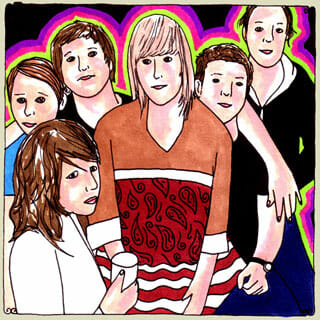- Welcome to Daytrotter
- This Blood Is Our Own
- Two Rabbits
- Night Dogs
- Stars
What we’re left with sometimes is a better idea of what it’s like to be flat on our backs, with a knot on the hairy side of our heads and a foggy view out, as if everything were milky or blended. We’ve been flipped backwards, the rug pulled violently out from beneath our feet, and left there to figure our own way back up, to come to our senses and do just that. There are those who have only known failure and there are those who have only known success, both situations equally bad as there’s no marker, no signifier to differentiate between. It’s either the all or the none and that’s just a murky, murky mess. The Love Language brokers in both principles with its music, letting us feel the sugary highs, chased quickly behind by the salty lows as if they were rabbits with bacon tied to their cotton tails, giving even more incentive for predatory capture and mauling. They might be the same rabbits that Stuart McLamb, the lead singer for this young North Carolinian band, sings about in the first song off of the group’s self-titled, debut album, “Two Rabbits.” The rabbits get spooked back into the forest, but the protagonist doesn’t give up aspiring to catch them some day, no matter that they got a head start and might be thumping like a storm toward the county line by now. McLamb, a forceful, yet agile singer with a penchant for rich undertones and wonderfully prose-filled lyrical conversations, makes a point in seeing and analyzing both sides of the fence, giving them equal floor to be heard and observed. He finds attractive conflictions in the abrasiveness of nearly everything from scurrying wildlife to metaphoric love and the thin ice line between good and evil as it applies to everything. There’s the love that he sees as being built like a diamond (so nearly unscratchable), but in the next breath mentions to us how it’s as susceptible and brittle as glass. He’d pour us another drink, but wait, he thinks that someone’s cracked the bottle of booze into a million splintered pieces. It’s that glass again, those breakables, they’re everywhere there tend to be buttery fingers or hands that have gotten too worked up to just hold tightly to anything at all. Also in “Lalita,” a song that rollicks like a barroom, but involves currents of something even more desperate and potentially harmful, McLamb sings about how he’s talking to the devil, but he thinks he heard an angel sing “lalalala.” It’s there that everything becomes so muddy and jumbled as the voice of the devil sounds at least strikingly similar to a choir of feathered do-gooders, those who watch over all of us lambs. We’re always stuck between what we’d like to think and what we have to think, or even just the idea that shit turns out in its own way and we might be chasing those rabbits through our dreams and our nightmares for the rest of our lives. Love might break all over us, until we’re old and wrinkled up into senior citizens, leaving us with that diamond dust in what we have left of our white hair. We might not be able to fish it all out either, as it will hide itself away amongst the color. McLamb and the Love Language give us these breathless songs of people hurtling along, doing the best they can with what they’ve got and nearly all of them are cut down right as they’re starting to feel most alive and it’s not too far from the way it works, but even after that rug bites, there’s a way to brush off and rise again.
